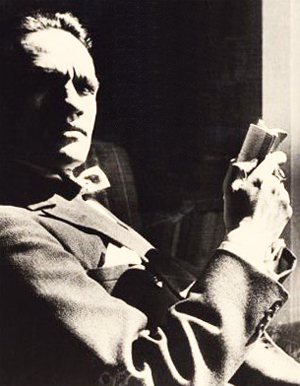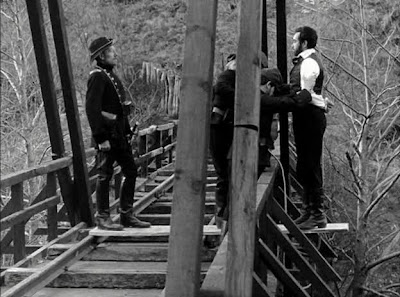A Warning to the Curious
 Sunday, August 31, 2014 at 02:33
Sunday, August 31, 2014 at 02:33 As I know very little about English geography – somewhat, I suppose, to my disappointment – it was not surprising to learn that the town of Seaburgh in this tale is really the town of Aldeburgh, Suffolk (Seaburgh does sound a mite Teutonic for an Anglian port). Further research informs me that the three crowns of Anglia, allegedly to be found in Suffolk, Norfolk, and Essex, do not fill the tomes of legend as one might have hoped – but all this is irrelevant. We do not need ancient Anglian monarchs, invading Vikings, or pristine topographical nomenclature to enjoy this author. Yet we do need England, and that we get in spades.
 The beginning will not be easy to follow, a stratagem that is wholly intentional. About our first narrator we know almost nothing save a predilection since his earliest days for the Eastern port of Seaburgh ("It is not very different now from what I remember it to have been when I was a child"). Although lush details "come crowding to the point of the pencil when it begins to write of" this salt-swept town, our nameless first narrator will soon pass the baton to a second, equally anonymous storyteller who had a very odd experience in Seaburgh with his now-deceased friend Henry Long one April month not so far back in our collective memory. Long and he pass the day in quiet boredom between golf rounds in a small hotel where they are some of the few lodgers. One fine day they receive a visit from one of the only other tenants:
The beginning will not be easy to follow, a stratagem that is wholly intentional. About our first narrator we know almost nothing save a predilection since his earliest days for the Eastern port of Seaburgh ("It is not very different now from what I remember it to have been when I was a child"). Although lush details "come crowding to the point of the pencil when it begins to write of" this salt-swept town, our nameless first narrator will soon pass the baton to a second, equally anonymous storyteller who had a very odd experience in Seaburgh with his now-deceased friend Henry Long one April month not so far back in our collective memory. Long and he pass the day in quiet boredom between golf rounds in a small hotel where they are some of the few lodgers. One fine day they receive a visit from one of the only other tenants:
So the ordinary public rooms were practically empty, and we were the more surprised when, after dinner, our sitting-room door opened, and a young man put his head in. We were aware of this young man. He was rather a rabbity anaemic subject – light hair and light eyes – but not unpleasing. So when he said: 'I beg your pardon, is this a private room?' we did not growl and say: 'Yes, it is,' but Long said, or I did – no matter which: 'Please come in.' 'Oh, may I?' he said, and seemed relieved. Of course it was obvious that he wanted company; and as he was a reasonable kind of person – not the sort to bestow his whole family history on you – we urged him to make himself at home.
This young man, whose name turns out appropriately enough to be Paxton, will become our third narrator, and when he buttonholes a local rector in conversation about the Ager family, we have our fourth degree of narration in as many pages. The intention of such distancing is clear: if we are to feel drawn into a world that existed twelve centuries ago, our direct experience will be less useful than a pungent relay of generations imbuing the narrative with vitality and significance. No one at any time denies Paxton his claims, which are fantastic, nor the tale of the crowns themselves, "buried in different places near the coast to keep off the Danes or the French or the Germans." Why? Because while the first crown "was dug up at Rendlesham ... and melted down before it was even properly described," and the second lost in a "Saxon royal palace ... now under the sea," the third crown has been "left doing its work, keeping off invaders." And it just so happens that our third narrator was able to guess – well, perhaps that's not quite the right word – where its work was being done.
The rest of the story has much to do with an old Latin adage about character – but anyway, back to our man Paxton. Paxton's destiny is determined by his insatiable curiosity, hence our title, but we never get a clear picture of why he is so eager to know the secrets of the past, and this is the story's masterstroke. An explanation of his motivations would have isolated him among thousands of similar dramatis personae who want to know too much, as well as made for a rather non-universal ghost story. Paxton is no better or worse than any other mild-mannered, educated person; his only flaw is that he does not comprehend what even the feeblest display of arrogance might earn him. So when a local man jowers about a church's coat of arms and Paxton correctly identifies it as the three crowns of Anglia, he is then ushered to the rector who tells him in detail of the wilting Ager family and its role as the guardians of these crowns. The last of this line is Willam Ager, "who has only died fairly recently," and who apparently lived close on the burial spot of that third jewel. "So the last of the holy crowns," concludes the clergyman, "if it's there, has no guardian now." Thus perhaps we should not snicker at Paxton's odd coincidences in the days that followed that report:
'That was what the rector told me, and you can fancy how interesting I found it. The only thing I could think of when I left him was how to hit upon the spot where the crown was supposed to be. I wish I'd left it alone. But there was a sort of fate in it, for as I bicycled back past the churchyard wall my eye caught a fairly new gravestone, and on it was the name of William Ager. Of course I got off and read it. It said "of this parish, died at Seaburgh, 19–, aged 28."' There it was, you see. A little judicious questioning in the right place, and I should at least find the cottage nearest the spot. Only I didn't quite know what was the right place to begin my questioning at. Again there was fate: it took me to the curiosity-shop down that way – you know – and I turned over some old books, and, if you please, one was a prayer-book of 1740 odd, in a rather handsome binding.'
What they find in that prayer-book will not be revealed here, but a page is kept open – come wind or weather, literally – with a razor blade for the duration of Paxton's suffering, with the razor blade at length offering our prospector an easier exit. The second narrator and the late Henry Long are helpful in their good-natured way, but even they recognize that in divulging their plans to save Paxton, "whispering seemed the proper tone," an opinion with which the reader will likely concur.
James is always wonderful reading, some say the best to have around a wintry hearth and deathly stillness of a snowbound night, but I will leave that decision to how well you want to sleep. There is a faithful film version extant of A Warning to the Curious, back when the BBC was cultivating programs other than moronic miniseries on moronic monarchs, and when we were not quite as skeptical of the phenomena a good haunting entails. Why be skeptical? After all, believing that our world and its endless impediments conceal another, less objective reality seems to the modern mind to be a matter of choice. Paxton acted of his own free volition and paid oh so dearly. And if fata volentem ducunt, you should see what the fates do to the unwilling.




